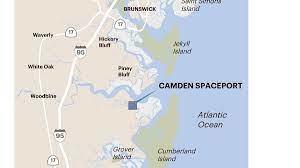
Caption
Supporters are counting on Spaceport Camden to create up to 2,000 jobs and help convince the next generation of aerospace engineers, many of whom graduate from Georgia Tech, to stay in Georgia.
Credit: Capitol Beat
|Updated: May 15, 2021 5:26 PM

Supporters are counting on Spaceport Camden to create up to 2,000 jobs and help convince the next generation of aerospace engineers, many of whom graduate from Georgia Tech, to stay in Georgia.
Camden County is pulling out all the stops to win approval of plans to build a commercial spaceport supporters say would represent a huge economic boost for southeastern Georgia.
The county spent nearly $825,000 between July 2020 and March of this year on a team of lobbyists, including a former chief of staff to Gov. Brian Kemp, to convince the state to endorse Spaceport Camden, according to documents filed by the county.
The spending came with a project seven years in the making approaching a final decision. While the Federal Aviation Administration (FAA) is due to decide by the end of next month whether to license the spaceport, it will be leaning heavily on the Georgia Department of Natural Resources (DNR) for recommendations.
“The timing would lead you to believe they needed help from the governor’s office to get pressure on the DNR,” said Dick Parker, one of a group of property owners on nearby Little Cumberland Island who oppose the project.
Supporters are counting on Spaceport Camden to create up to 2,000 jobs and help convince the next generation of aerospace engineers, many of whom graduate from Georgia Tech, to stay in Georgia. The project has the backing of Gov. Brian Kemp and the state’s congressional delegation.
Camden County Administrator Steve Howard, who also serves as project leader for the spaceport, said up to a dozen companies have shown “high-level interest” in launching commercial satellites from Spaceport Camden.
“It’s a once-in-a-generation opportunity for Georgia to play a very important role in the next space race,” Howard said.
The FAA originally was expected to decide whether to issue a launch license for the spaceport in late 2016. But the project was delayed when the county made a significant change in design that called for launching only small rockets from the site rather than medium-to-large rockets.
The project’s opponents say the FAA hasn’t done an adequate analysis of the impacts of the design change.
“These rockets operate differently,” said Brian Gist, senior attorney with the Southern Environmental Law Center. “They have a higher failure rate. They’re experimental.”
But John Simpson, a lobbyist in the Atlanta office of Capitol Resources LLC, said Spaceport Camden has made a commitment not to launch experimental rockets.
Simpson cited a March letter from the FAA to the Georgia Department of Community Affairs asserting that the risk posed by the type of small rockets Spaceport Camden proposes to launch would be significantly smaller than the risk from launching medium-to-large rockets.
The FAA also indicated small-rocket launches from the spaceport would be on the same footprint covered by launches of larger rockets, only smaller.
Kevin Lang, another Little Cumberland Island property owner, said even that smaller footprint encroaches on environmentally fragile marshland.
“There’s a 7,300-foot radius around the launch pad that is considered a debris disposal area,” he said. “The purpose of that area is to catch all the debris from a launch failure on the pad or early in the launch.
“Over two-thirds of the area is coastal salt marsh owned by the DNR … property they have an obligation to protect.”
As part of its review of the spaceport plan, the DNR must determine whether allowing satellite launches over marshland is consistent with the marsh’s protected status.
“If they follow the law, they should withhold their concurrence,” Lang said.
Opponents say the FAA also has given short shrift to the impact satellite launches would have on the people and structures beneath the flight path. That would include residents of Little Cumberland Island, campers and other visitors to the Cumberland Island National Seashore and several historic structures.
“The FAA has said this is the closest-ever populated area they’ve sought to launch rockets across,” Gist said.
But Howard said the FAA has determined any risk from satellite launches at Spaceport Camden would be limited to the footprint of the launch site and not extend to Cumberland Island or Little Cumberland Island.
“The analysis we’ve seen shows you can do this safely,” he said.
With the time for a final decision approaching, Camden County has added to the team of lobbyists who have been working the project for years.
Former Kemp Chief of Staff Tim Fleming registered as a lobbyist for the county in February, according to a report filed with the Georgia Government Transparency & Campaign Finance Commission, five months after leaving the governor’s office. Joining the Spaceport Camden team at the same time was Chuck Harper, a former deputy chief of staff to Kemp.
Lobbying firms that have been on the spaceport team longer include Simpson’s Capitol Resources, Joe Tanner and Associates and Washington, D.C.-based Capitol Hill Communications.
Howard said it was important to bring in such a large team of lobbyists and consultants because of the nature of Spaceport Camden.
“You’re not building a road or a park. It’s a very complex subject,” he said. “You have to have subject matter experts.”
This story comes to GPB through a reporting partnership with Capitol Beat News Service.